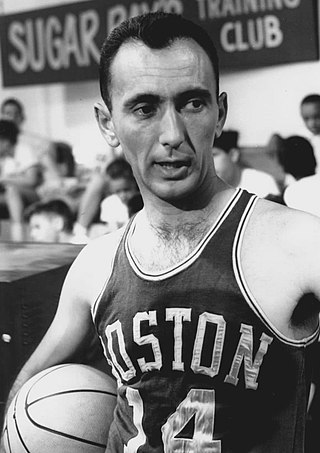
Robert Joseph Cousy is an American former professional basketball player. Cousy played point guard for the Boston Celtics from 1950 to 1963, and briefly with the Cincinnati Royals during the 1969–70 season. A 13-time NBA All-Star and 1957 NBA Most Valuable Player (MVP), he was a core piece during the early half of the Celtics dynasty winning six NBA championships during his 13-year tenure with the Celtics. Nicknamed "The Houdini of the Hardwood", Cousy was the NBA assists leader for eight consecutive seasons, introducing a new blend of ball-handling and passing skills to the NBA. He is regarded as the first great point guard of the NBA.
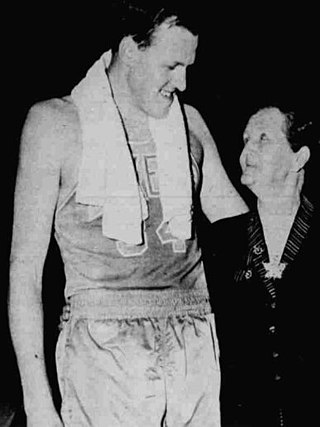
Clyde Edward Lovellette was an American professional basketball player. Lovellette was inducted into the Naismith Memorial Basketball Hall of Fame in 1988. He was the first basketball player in history to play on an NCAA championship team, Olympics gold medal basketball team, and NBA championship squad.

Artis Gilmore Sr. is an American former professional basketball player who played in the American Basketball Association (ABA) and National Basketball Association (NBA). Gilmore was inducted into the Naismith Memorial Basketball Hall of Fame on August 12, 2011.

Ralph Lee Sampson Jr. is an American former professional basketball player. He is a member of the Naismith Memorial Basketball Hall of Fame. A 7-foot-4-inch (2.24 m) phenom, three-time college national player of the year, and first overall selection in the 1983 NBA draft, Sampson brought heavy expectations with him to the National Basketball Association (NBA).

Donald Arvid Nelson is an American former professional basketball player and head coach. Nelson is second all-time in regular season wins of any coach in NBA history, with 1,335. He coached the Milwaukee Bucks, the New York Knicks, the Dallas Mavericks, and the Golden State Warriors. After an All-American career at the University of Iowa, Nelson won five NBA championships playing with the Boston Celtics, with his number 19 retired by the franchise in 1978.

Robert Allen McAdoo Jr. is an American former professional basketball player and coach. He played 14 seasons in the National Basketball Association (NBA), where he was a five-time NBA All-Star and named the NBA Most Valuable Player (MVP) in 1975. He won two NBA championships with the Los Angeles Lakers during their Showtime era in the 1980s. In 2000, McAdoo was inducted into the Naismith Basketball Hall of Fame. He was named to the NBA 75th Anniversary Team in 2021.
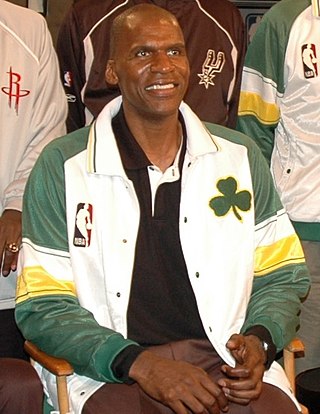
Robert Lee Parish is an American former professional basketball player who played 21 seasons as a center in the National Basketball Association (NBA), tied for second most in league history. He played an NBA-record 1,611 games in his career. Parish was known for his strong defense, high arcing jump shots, and clutch rebounding late in games.
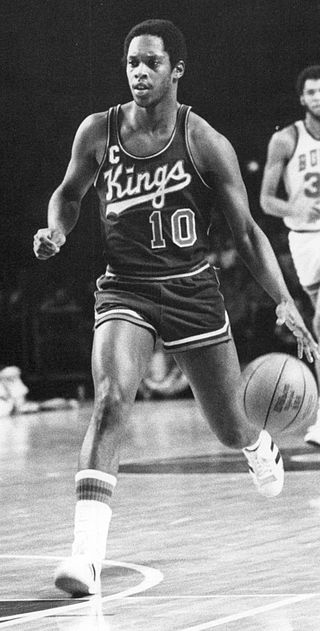
Nathaniel "Tiny" Archibald is an American retired professional basketball player. He spent 14 years playing in the National Basketball Association (NBA), most notably with the Cincinnati Royals/Kansas City–Omaha Kings and Boston Celtics. In 1991, he was enshrined in the Naismith Memorial Basketball Hall of Fame.

Samuel Jones was an American professional basketball player who was a shooting guard for the Boston Celtics in the National Basketball Association (NBA). A five-time NBA All-Star, he was known for his quickness and game-winning shots, especially during the NBA playoffs. Jones has the second most NBA championships of any player (10), behind only his teammate Bill Russell (11). He was also one of only three Celtics to be part of each of the Celtics' eight consecutive championships from 1959 to 1966. Jones is a member of the Naismith Memorial Basketball Hall of Fame.

Reginald Wayne Theus is an American basketball coach and former player. He played 13 seasons in the National Basketball Association (NBA), where he was a two-time NBA All-Star. He is currently the head men's basketball head coach and athletic director at Bethune–Cookman. He was the head coach for the NBA's Sacramento Kings and in college with the New Mexico State Aggies and the Cal State Northridge Matadors men's teams. He was also an assistant coach for the Louisville Cardinals under Rick Pitino.
Gregory Ballard was an American professional basketball player and NBA assistant coach. A collegiate All-American at Oregon, Ballard averaged 12.4 points and 6.1 rebounds over an eleven season NBA career with the Washington Bullets, Golden State Warriors and briefly, the Seattle SuperSonics.
The 1981 NBA World Championship Series was the championship round of the National Basketball Association (NBA)'s 1980–81 season, and the culmination of the season's playoffs. It pitted the 62–20 Eastern Conference champion Boston Celtics against the 40–42 Western Conference champion Houston Rockets. This series has the distinction of featuring for the third time in NBA history, and last to date, a team with a losing record in the Finals. They were the first team since the Minneapolis Lakers in 1959 to reach the championship round despite having more regular season losses than wins. This, along with 1986, was one of the only two NBA championships of the 1980s not to feature the Lakers.

The 1974–75 NBA season was the 29th season of the National Basketball Association. The season ended with the Golden State Warriors winning the NBA Championship, sweeping the Washington Bullets 4 games to 0 in the NBA Finals.

Gregory Fuller Kite is an American retired professional basketball player. Kite was a member of two NBA Championship teams with the Boston Celtics in 1984 and 1986. Kite played eleven NBA seasons.

Bailey E. Howell is an American former professional basketball player. After playing college basketball at Mississippi State, Howell played 12 seasons in the National Basketball Association (NBA). Howell was a six-time NBA All-Star, two-time NBA champion and was inducted into the Naismith Memorial Basketball Hall of Fame in 1997.
Kevin Douglas Gamble is a retired American professional basketball player in the National Basketball Association and currently a scout with the Toronto Raptors. At 6'5" he played as both a shooting guard and small forward.
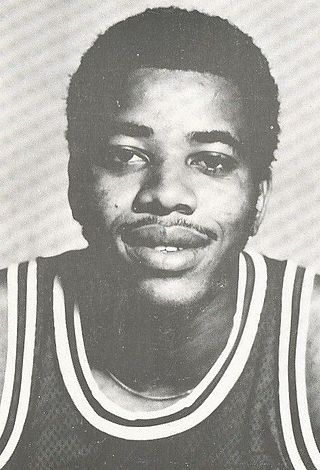
Otis Lee Birdsong is an American former professional basketball player. He spent twelve seasons (1977–1989) in the National Basketball Association (NBA) and appeared in four NBA All-Star Games.
Stephen Phil Kuberski is an American former professional basketball player. Kuberski won two NBA titles with the Boston Celtics, in 1974 and 1976 and had a nine-year National Basketball Association (NBA) career. Kuberski was the last Celtic to wear number 33 before Larry Bird.

Henry J. Finkel is an American basketball player whose professional career lasted from 1966 to 1975. Selected by the Los Angeles Lakers in second round of the 1966 NBA draft he remained with the team through 1966–67, then played with the San Diego Rockets from 1967 to 1969 and spent the remaining years with the Boston Celtics, when, during his next to last season, the Celtics won the 1974 NBA Championship.

The 1975–76 Phoenix Suns season was the eighth season for the Phoenix Suns of the National Basketball Association. The season included an improbable run to the NBA Finals by a team that had never won a playoff series and made the playoffs only one other season in the franchise's existence. With a regular season record of 42–40, the Suns had finished third in the Pacific division standings and improved upon last season's win total by 10 games. The ensuing playoff run took plenty by surprise, including a seven-game series win against the Western Conference's top seed and defending NBA champion Golden State Warriors, a team that had finished 17 games ahead of the Suns in the divisional standings. The franchise's first Finals appearance pitted them against a 12-time champion in the Boston Celtics, whose roster featured three players from that season's All-Star Game. The 1976 NBA Finals would feature a memorable Game 5 triple-overtime thriller filled with controversies in which the Suns narrowly lost. Returning home for Game 6, the demoralized Suns would lose Game 6 and the series but not before endearing a generation of fans to the Suns franchise and showcasing basketball from the desert southwest. The team's "Cinderella" season earned them the nickname Sunderella Suns. John MacLeod was head coach and the Suns played their home games at Arizona Veterans Memorial Coliseum.
















